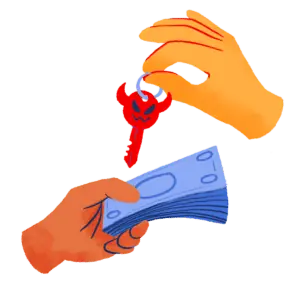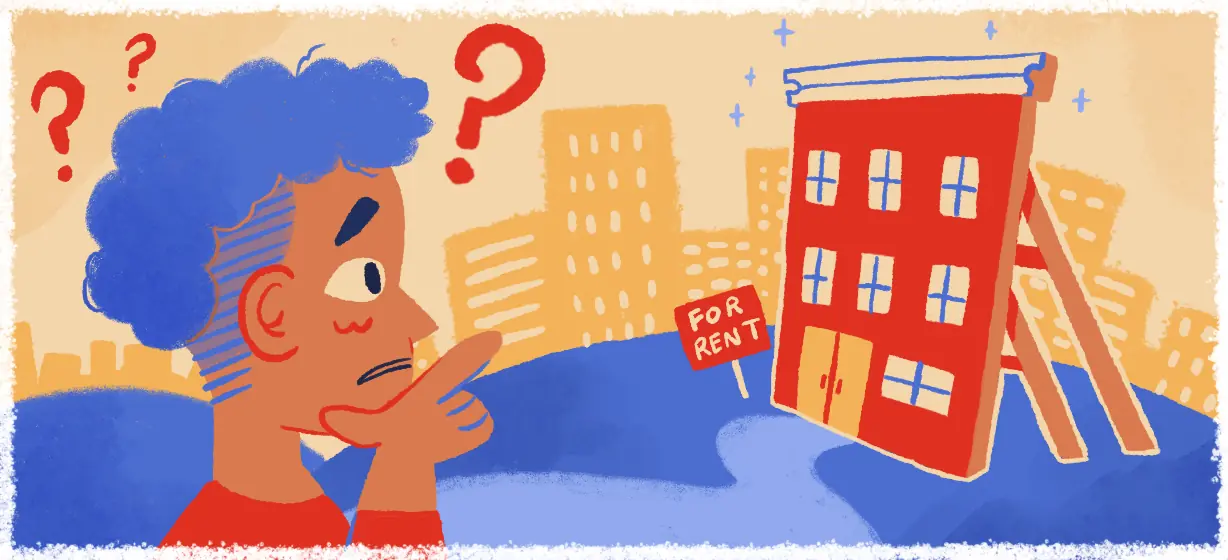The 5 Rental Scams To Watch Out for While Apartment Hunting
Posted in: I'm Moving, Moving Advice, Neighborhood AdviceThere’s a lot to consider when searching for a new apartment to rent. Does it have enough space? Is it affordable? Is it located in a nice neighborhood?
But one question you might not have considered: Is it a scam?
Like moving scams, rental scams are a relatively rare (but possible) pitfall people often come across. The last thing you want when going through the process of relocating is to find out that you overpaid—or that your rental doesn’t even exist!
The 5 Most Common Rental Scams
Here are five of the most common rental scamming techniques from the scammer playbook.
1. Fake rentals: the disappearing apartment trick

The scammer might have pulled pictures from a home that actually was for rent or sale in the past, but is no longer on the market. Or they might make up an address with amazing amenities for a non-existent rental.
Their goal? They hope you pay them before you figure it out.
Usually, often before you’ve even seen the property, the scammers will ask you to wire money for a security deposit or the first month’s rent so they can “hold it for you” and take the unit off the market.
That sense of urgency is meant to pressure you into sending the funds, even if little alarm bells are ringing in the back of your mind. Then, the scammer makes off with your money and/or sensitive personal information, which they might use for more fraud in the future (as a bonus).
2. Spoofing other legitimate ads
Sometimes the fraudulent ads you see online are for an actual rental that’s currently available. However, the scammer simply stole the photos and details from the official listing and made a copy. They don’t really have an affiliation with the property management company or the authority to rent the space out.
“Most landlords run background checks or credit checks as a standard part of their tenant screening process, and the cost of doing so usually shouldn’t amount to more than a $60 fee.”
Regardless, they will change the contact information on the spoofed listing to their own info. They often drop the price significantly so it looks like a steal for the market. When you inquire about the property, the scammer will let you know that they’ve had a ton of interest and it won’t be available long. Again, you’re asked to wire money to secure the rental, only to find out later that you haven’t legally rented it at all, or perhaps there was never an apartment to rent in the first place.
3. Bait-and-switch listings

There is a type of scam where the listing is technically real, but what you get is not what you see online. A bait-and-switch rental scam involves promoting one rental unit with amazing features and amenities, then having you sign a lease for something much less desirable.
For instance, the scammer might post a listing for a three-bedroom, two-bathroom apartment with a view of the city park and a premium parking spot. But when you show up to sign the lease, that unit is mysteriously no longer available. Instead, you get the one-bedroom overlooking the dumpsters with street parking—for the same premium price.
This is most effective if you’re short on time, or the rental market in your area is extra competitive. The lack of options means you may be willing to settle for anything, and the scammers know it.
4. No lease, no rules

Unlike some of the other scams that primarily function using the anonymity of the internet to work, this one can be done with legitimate listings you’d see anywhere. You might think a handshake agreement is good enough, but that puts you at risk as a renter.
Without a lease, you don’t have any legal protections. The “landlord” may be able to jack up the rent or kick you out at any time, and they won’t have any obligation to maintain or repair the property. (You should always know your renter’s rights!)
In a worst-case scenario, this person might not actually have any legal authority to rent to you (hence the lack of a lease) and may run off with your first month’s rent and security deposit before you figure that out.
See prices for local moving labor. Read real customer reviews. Easily book your help online.
5. Made-up fees through the roof
Finally, be on the lookout for property owners who charge you way more than necessary for basic rental or application fees.
Most landlords run background checks or credit checks as a standard part of their tenant screening process, and the cost of doing so usually shouldn’t amount to more than a $60 fee. Anything double that amount or more is likely just to eke out some extra cash from you, with the unscrupulous landlord attempting to pocket the difference.
“The Multiple Listing Services (MLS) is a database used by realtors to manage real estate listings. If the photos for a rental have the MLS watermark, it means the person who made the listing stole them from a legitimate site.”
Much like the no-lease scam, this can affect any type of listing, be it online or otherwise. Be sure you have it in writing beforehand what fees they’re charging during the process of your application, or over the course of your lease.
How To Avoid Scams While Apartment Hunting
So how do you avoid these scams when looking for a place to live? There are some tell-tale signs you can watch for. If you come across any of these red flags, there’s a good chance you’re looking at a scam:
- They ask you for money upfront. Besides reasonable application fees that should be disclosed in the ad for the apartment, if someone asks you to wire a deposit or asks for a down payment before you can see the property, it’s a huge red flag. As the FTC says, “There’s never a good reason to wire money to pay a security deposit, application fee, first month’s rent, or vacation rental fee.”
- They don’t ask you anything about yourself. Landlords use personal information like your credit score and paystubs to establish you can reasonably pay for the apartment. The ones who don’t ask these or similar questions might not care about that, because they’re planning to take your money and run!
- The photos have an MLS watermark. The Multiple Listing Services (MLS) is a database used by realtors to manage real estate listings. If the photos for a rental have the MLS watermark, it means the person who made the listing stole them from a legitimate site.
- The landlord is “out of town”. It’s a convenient excuse for not being able to show you the property before you send money. But if they’re really interested in renting the unit—and there really is a unit to rent—they’ll at least coordinate a virtual or video conference and tour to show the property.
- The rent is way lower than similar rentals in the neighborhood. If the price seems too good to be true, it almost certainly is.
- The listing is full of errors. If the description of the rental has a lot of typos and grammatical errors, it’s probably not real. Any landlord who is serious about renting their space will take the time to write and proofread the listing.
See prices for local moving labor. Read real customer reviews. Easily book your help online.
More ways to double-check that your apartment is legit
With all that said, you can take a few steps when searching for an apartment to avoid getting wrapped up in a scam:
- Look up a rental’s address online to verify it exists and that there aren’t any problems, such as a pending foreclosure
- Do a reverse Google image search to see if the listing’s photos have been copied from somewhere else
- Meet the landlord in person, and do some research on the person/property management company to verify they’re a real person offering to legally rent you a place, or an actual business filled with, you know, real humans
- See the property in person before paying or signing anything
- Get all agreements in writing, including the cost of rent, the specific unit, and any other fees paid
- Always have a lease in place, signed by both you and the property owner/manager
How To Report a Rental Scam
As you just learned, there are many types of scams associated with moving. If you do find out that you were the victim of a rental scam, it’s important to report it to the appropriate authorities. You might be able to recover any lost money, or at the very least, prevent them from scamming anyone else. Here’s who to contact:
- The website where the ad was posted, so they can remove it
- Your local law enforcement and state consumer protection agency
- The Federal Trade Commission (FTC)
- The FBI Internet Crime Complaint Center






